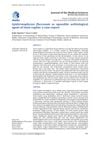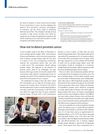 3 citations,
January 2024 in “Signal transduction and targeted therapy”
3 citations,
January 2024 in “Signal transduction and targeted therapy” Lymphatic vessels are essential for health and can be targeted to treat various diseases.
 46 citations,
September 2014 in “Steroids”
46 citations,
September 2014 in “Steroids” Plant steroid hormones show growth, health, and medicinal benefits in various organisms, including potential for treating diseases.
 54 citations,
January 2023 in “Signal Transduction and Targeted Therapy”
54 citations,
January 2023 in “Signal Transduction and Targeted Therapy” New therapies are being developed that target integrin pathways to treat various diseases.
[object Object] 8 citations,
February 2018 in “European journal of oncology nursing” The Hair Check tool can measure hair loss, but patients' own reports are more reliable for assessing hair loss during chemotherapy.
 2 citations,
November 2019 in “Skin appendage disorders”
2 citations,
November 2019 in “Skin appendage disorders” Platelet-rich plasma doesn't prevent hair loss from chemotherapy, and mononuclear cells only help against hair loss from one specific chemotherapy drug.
9 citations,
November 2020 in “The FASEB journal” Intermediate filaments are crucial for cell differentiation and stem cell function.
 36 citations,
November 2018 in “American Journal of Clinical Dermatology”
36 citations,
November 2018 in “American Journal of Clinical Dermatology” Alopecia is linked to various health and mental conditions, impacts life quality, and needs medical attention beyond its cosmetic effects.
 2 citations,
October 2022 in “International journal of Ayurvedic medicine”
2 citations,
October 2022 in “International journal of Ayurvedic medicine” Licorice has many traditional health benefits, but more research is needed to fully support these claims.
 3 citations,
April 2021 in “Berkala ilmu kedokteran/Journal of the medical sciences”
3 citations,
April 2021 in “Berkala ilmu kedokteran/Journal of the medical sciences” A fungus called Epidermophyton floccosum can cause scalp infections.
 12 citations,
January 2013 in “Bundesgesundheitsblatt - Gesundheitsforschung - Gesundheitsschutz”
12 citations,
January 2013 in “Bundesgesundheitsblatt - Gesundheitsforschung - Gesundheitsschutz” Older adults still engage in sexual activities but face challenges like health issues and lack of professional support, highlighting the need for better healthcare provider education and research on sexual fulfillment in old age.
 76 citations,
December 2009 in “Clinics in Dermatology”
76 citations,
December 2009 in “Clinics in Dermatology” Hormonal treatments can help with acne but are not the first choice due to side effects and the need for careful patient selection.
 1 citations,
September 2023 in “Acta dermato-venereologica”
1 citations,
September 2023 in “Acta dermato-venereologica” Certain genetic variants are linked to frontal fibrosing alopecia in Spanish patients.
 295 citations,
September 2006 in “Cell Cycle”
295 citations,
September 2006 in “Cell Cycle” The conclusion is that using drugs to block the TOR pathway might slow aging and prevent age-related diseases.
 18 citations,
March 2009 in “Medical Hypotheses”
18 citations,
March 2009 in “Medical Hypotheses” The document suggests that blocking sweat glands with antiperspirants might allow skin-generated hormones to be absorbed, possibly increasing breast and prostate cancer risk.
 3 citations,
February 2005 in “Lung Cancer”
3 citations,
February 2005 in “Lung Cancer” The new chemotherapy combination for advanced lung cancer showed a 35.7% response rate but caused significant side effects.
 March 2011 in “European Urology Supplements”
March 2011 in “European Urology Supplements” Blood tests for tumor cells could improve prostate cancer diagnosis and treatment; hair loss severity linked to a gene affecting prostate conditions.
 February 2007 in “Lancet Oncology”
February 2007 in “Lancet Oncology” Using a single PSA level to decide on a prostate biopsy is not effective; a more personalized approach considering various factors is recommended.
 38 citations,
December 2009 in “Therapeutic Advances in Medical Oncology”
38 citations,
December 2009 in “Therapeutic Advances in Medical Oncology” The conclusion suggests that prostate cancer should be classified by castration status and that new therapies targeting androgen receptor signaling show promise.
 18 citations,
June 2018 in “Journal of The American Academy of Dermatology”
18 citations,
June 2018 in “Journal of The American Academy of Dermatology” Fat tissue treatments may help with wound healing and hair growth, but more research with larger groups is needed to be sure.
 61 citations,
January 2019 in “American Journal of Clinical Dermatology”
61 citations,
January 2019 in “American Journal of Clinical Dermatology” The cause of Frontal Fibrosing Alopecia is unclear, diagnosis involves clinical evaluation and various treatments exist, but their effectiveness is uncertain.
 3 citations,
April 2019 in “Clinical Therapeutics”
3 citations,
April 2019 in “Clinical Therapeutics” Computational tools identified 29 drugs that could potentially target 19 genes involved in chemotherapy-induced hair loss, which could lead to more effective treatments.
October 2022 in “Biomedicines” Finasteride in male rats causes liver and metabolic issues in their offspring.
 19 citations,
November 2021 in “Reviews in endocrine and metabolic disorders”
19 citations,
November 2021 in “Reviews in endocrine and metabolic disorders” Sex hormones like estrogen and testosterone may affect COVID-19 severity differently in men and women, potentially influencing prevention and treatment strategies.
[object Object]  260 citations,
January 2019 in “Pharmaceutics”
260 citations,
January 2019 in “Pharmaceutics” Niosomes are a promising, stable, and cost-effective drug delivery system with potential for improved targeting and safety.
22 citations,
July 2015 in “PloS one” Foxp1 helps control hair stem cell growth and response to stress during hair growth cycles.
 489 citations,
November 2021 in “Signal Transduction and Targeted Therapy”
489 citations,
November 2021 in “Signal Transduction and Targeted Therapy” The JAK/STAT pathway is important in cell processes and disease, and JAK inhibitors are promising for treating related conditions.
 9 citations,
April 2021 in “Evidence-based complementary and alternative medicine”
9 citations,
April 2021 in “Evidence-based complementary and alternative medicine” Guilu Erxian Glue may help reduce chemotherapy side effects like weight loss and heart stress.
 January 2017 in “Springer eBooks”
January 2017 in “Springer eBooks” Eating a balanced diet with specific nutrients can help manage menopause symptoms and prevent related health issues.
 July 2011 in “British Journal of Dermatology”
July 2011 in “British Journal of Dermatology” Dermatologists give better information on pathology forms, hypersensitivity vasculitis is a common skin issue, misdiagnoses can occur, and various skin conditions are linked to loss of elastin or genetic factors.
 20 citations,
July 2015 in “Journal der Deutschen Dermatologischen Gesellschaft”
20 citations,
July 2015 in “Journal der Deutschen Dermatologischen Gesellschaft” Green tea may help with skin health and protect against UV damage, but more research is needed to confirm its safety and effectiveness.


























